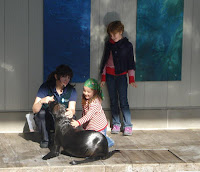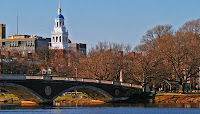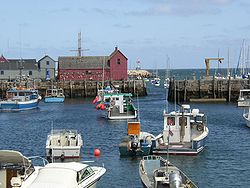We're missing Christmas this year: 'missing' in the nostalgic sense that you might miss a favourite television programme which has subsequently been remade with different actors, a slightly altered script, and the wrong geographical location. Christmas in Cambridge, Massachusetts is not Christmas in England.
Some of the differences can be attributed to the different cultural contexts of the two places. Perhaps if we drove out to a huge shopping mall, Christmas would look more familiar, but we shop locally and we don't have a car. And, perhaps, if Cambridge were not so notably liberal (which we love) then people would assume that other people would be celebrating Christmas on the 25th December too. But daily life here is assertively secular: at weekends, people might pack out the pews in denominational and non-denominational churches, meeting houses and revivalist services, Jewish or Sikh or Buddhist Temples, and Islamic mosques, but outside one's religious enclave there is little discourse around God or anything remotely God-related. The girls' school, for example, celebrates neither Christmas nor Hannukah this week; although Iola is looking forward to performing as a cow in the upcoming Kindergarten performance of 'The Gingerbread Man'.
Some of the differences might also be attributed to history. While Thanksgiving has, allegedly, been a major American holiday since 1621, it was a criminal offense to celebrate Christmas in New England until 1681. The underlying Puritannical scepticism of the event and its paganistic roots continued for several more centuries. In 1712, for example, the Reverend Cotton Mather criticized Christmas because "the feast of Christ's Nativity is spent in Reveling, Dicing, Carding, Mocking, and in all Licentious Liberty... by Mad Mirth, by Long Eating, by Hard Drinking, by Lewd Gaming" (thanks to Fred Small for sending me this quote). Christmas didn't become an official holiday in New England until the mid-1800s.
In the changing rooms of the local gym today I overheard one woman reminding another that there would be no yoga class next Sunday because of the "holiday". They both know that I am from England: "Do you have Christmas in England?" I was asked.
I nodded: "Yes, we have Christmas in England" (but do we have 'have' Christmas, or do we 'do' Christmas? I've reached a grammatical quandary on this.)
The larger of the two women was almost overcome with excitement on my behalf. "Oh, so you know a bit about Christmas already - how wonderful for you to have this opportunity to celebrate Christmas in Cambridge. I bet that you've never seen anything like this before!"
In so many ways she was, of course, completely right; but not for the reasons that she imagined. I began to try and explain some of the ways in which Christmas here contrasts to the English experience, but conversations in changing rooms are by their nature difficult to sustain - I needed to shower, she needed to pull an assortment of turtle necked sweaters over her head. It's easier to explain when you can use a few bullet points...
- Christmas decorations.
The house down the road has updated its garden decorations: the inflatable Thanksgiving turkey, which replaced the inflatable witch and pumpkins at Hallowe'en, has now been replaced by an inflatable Santa's grotto complete with inflatable elves and penguins (we will keep you up-to-date with what happens next...). A few local houses have Christmas lights in their gardens and Christmas trees visible in their living rooms and Feneuil Hall, a tourist mecca in Boston, displays the largest Christmas tree we have ever seen. But we have struggled to find ornaments for our own tree. One can buy neither tinsel nor baubles in the Cambridge shops. And, while Harvard Square looks beautiful with white lights on a few of the trees in the park and a very tasteful blue light display over the main shopping street, the decorations ostensibly bear little relevance to Christ's birth and look more like a visual representation of the beginnings of the universe. Pretty, but not Christmas as we have previously known it.
- The soundtrack.
Our favourite busker performs as a one-man band. He knows a fantastic array of songs including every word to Bob Dylan's 'Tangled up in Blue'. He does not know all of the words to 'Jingle Bells' and, to Iola's utter amazement, had to dismantle his one-man band to look for the lyrics in his rucksack.
The Salvation Army do an amazing job here, as in England, through their work with the homeless and needy. In England they raise money through brass bands performing carols in nearly every town. In Cambridge, one man sits alone on a fold-down red stool near the main entrance to Harvard Square station and rings a small tin bell. It is not the same.
We were excited on Friday evening to hear a bunch of carolers. We paused to listen. They heard our English accents and begged us to join them: did we know the tune to 'In the Bleak Midwinter'? They had the lyrics, but they didn't know the melody. We're not the world's best singers, but we did our bit - standing for ten minutes in the doorway to Harvard Coop Bookstore bellowing out a few of the carols from their printed sheets. They did not sound as good, with us singing, as they would have done by a proper choir.
- The food.
Thanksgiving has a set menu to which nearly everyone we met adheres: turkey, cranberry sauce, pumpkin pie. For weeks beforehand, people talked about how they were going to cook their turkey, for weeks afterwards they compared notes on the success, or otherwise, of their Thanksgiving meal. We have not had any conversations about Christmas lunch. We have grown used to managing without many of the eccentricities of our English diet: marmite, marmalade, tea; but we hadn't anticipated managing without mince pies or Christmas pudding (we found one for sale, but at $25 it seemed an extravagance too far).
When we first moved here, we were sent on a cultural awareness training event by Nathan's employer (a standard practice, they claimed, for all new international recruits rather than a response to something we had said or done). Maya was particularly excited by the fact that she had become a "third-culture kid", that is a child who lives at the intersection of two cultures rather than feeling the need to conform unquestioningly to either one. There is, apparently, an increasingly sizeable body of evidence of the benefits to children from living at the intersections between cultures rather than being mono-cultured. They are able to appreciate other cultures, but they are also able to develop their own ways of doing things from what is available, merging and cross-fertilising traditions and new ideas.
We are missing Christmas in the way that one might literally 'miss' something - a bus, for example. But Nathan has taught me well - if you miss the bus (as he, ahem, frequently does) you walk to your destination instead. Therefore, our Christmas tree is decorated with a strand of lights we were able to find in the hardware shop (the box carefully replacing the word 'Christmas' with 'celebration') and a blizzard of paper snowflakes which the girls have enjoyed making. We have a wide range of Christmas carols downloaded onto Spotify and we’ve bought a few new vinyl records of Christmas classics and less well-known tracks (including a song by the 1950s blues singer, Johnny Guardiani, which claims that the secret behind Santa Claus' smile is his reefer-smoking habit!) I'm typing this blog while cooking our last-minute Christmas cake and making a vat of mincemeat (apricots have replaced candied peel, sour cherries have replaced the glace ones, and my fingers are crossed that 'all purpose flour' will work as well as 'self-raising').
We can't fully recreate an English Christmas but we're not adhering to the Cambridge way of doing Christmas either. It might be an improvised and makeshift Christmas in some of its aspects, but it will still be perfect for us and our third-culture kids.

































